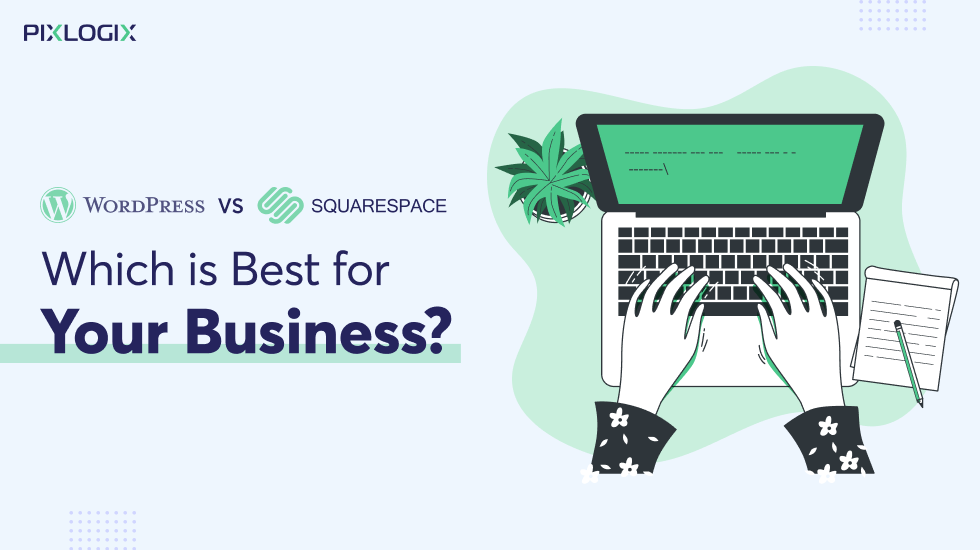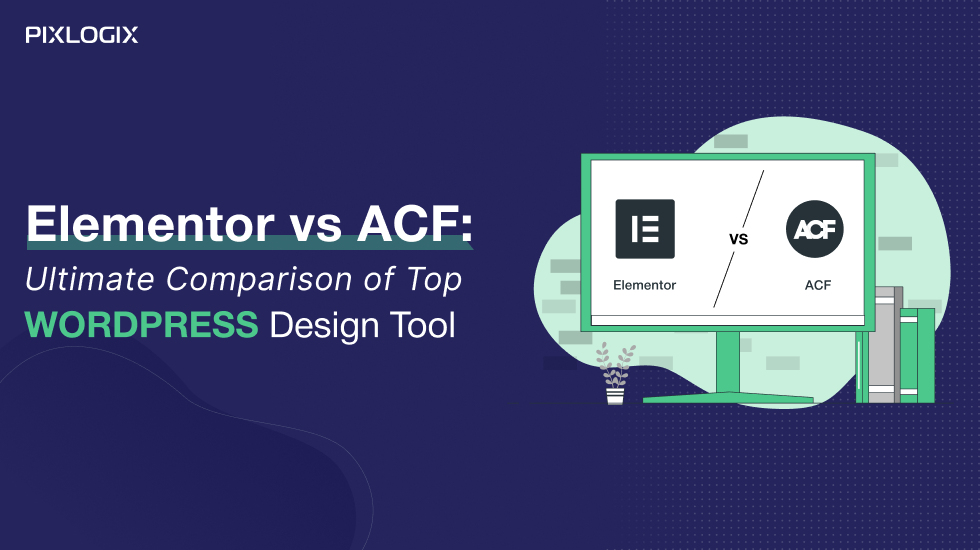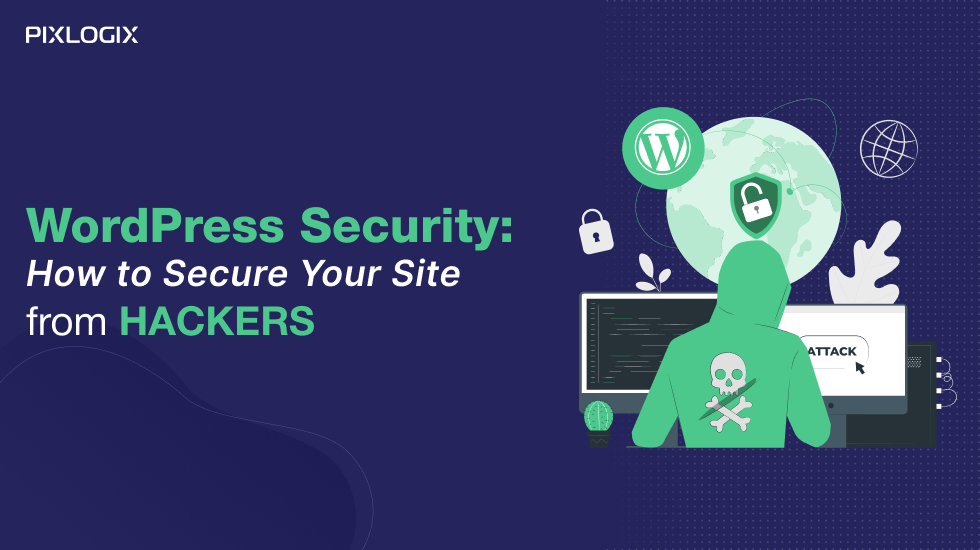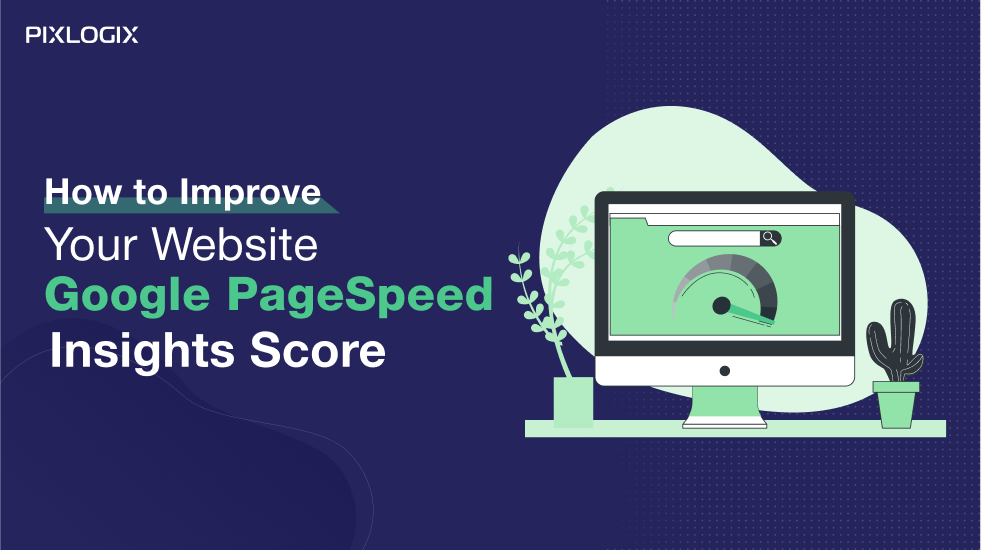WordPress vs Squarespace: Which is Best for Your Business?

- Last Updated On July 17, 2024
- 21 min read
When it comes to building that website, two giants stand at the forefront: WordPress and Squarespace. These two platforms have garnered immense popularity over the years, each offering a unique set of features and capabilities.
But the question remains: Which is the best choice for your business?
In this blog post, we’re embarking on a journey to answer that very question. We’ll delve deep into the intricacies of WordPress and Squarespace, comparing them and helping you decide which platform aligns best with your business goals.
WordPress vs Squarespace: At a Glance
When it comes to creating a website for your business or personal endeavors, Squarespace and WordPress are two of the most prominent players in the game. They cater to different needs and offer distinct advantages, making the choice between them a crucial decision. Let’s take a quick look at both platforms to help you make an informed choice.
Squarespace
Squarespace is renowned for its user-friendly approach. It’s an all-in-one platform that combines website building, hosting, and domain registration, making it an attractive option for beginners or those who prefer a hassle-free experience.
Beautiful Templates
Squarespace is known for its visually stunning templates. The platform offers a range of professionally designed themes that are perfect for creative businesses or individuals who prioritize aesthetics.
User-Friendly
Squarespace’s drag-and-drop editor is intuitive, allowing users with minimal technical skills to create a polished website quickly.
Integrated Features
It includes essential features like eCommerce, blogging, and SEO tools, all in one package, simplifying the process of getting your website up and running.
Reliable Hosting
Squarespace takes care of hosting, ensuring your website is secure and responsive.
However, Squarespace does have some limitations. WordPress is more flexible, and customization options are somewhat restricted. Advanced users might find it limiting when trying to implement specific functionalities.
WordPress
WordPress is a versatile open-source platform that powers over a third of all websites on the internet. It offers a wealth of features and customization options.
Flexibility
WordPress is incredibly flexible, allowing you to create virtually any type of website, from blogs to eCommerce sites to complex web applications.
Vast Plugin Ecosystem
With thousands of plugins available, you can add almost any feature or functionality you can imagine to your WordPress site.
Community Support
The WordPress community is vast, providing a wealth of resources, themes, and plugins. There’s a solution for almost any problem you might encounter.
Self-Hosting
Unlike Squarespace, WordPress requires you to arrange your hosting, giving you more control but also more responsibility.
While WordPress offers unparalleled versatility, it can be overwhelming for beginners and may require a steeper learning curve. Additionally, self-hosting can lead to higher maintenance and security responsibilities.
WordPress vs Squarespace: Trending stats and facts
Trending stats and facts about Squarespace:
- Squarespace powers over 3.5 million websites worldwide.
- Squarespace’s revenue grew by 40% in 2022 to $1.2 billion.
- Squarespace’s stock price has increased by over 200% in the past year.
- Squarespace is used by some of the world’s leading brands, including Nike, Spotify, and Harvard University.
Trending stats and facts about WordPress:

image creadit – trends.builtwith.com
- WordPress powers over 43% of all websites on the internet.
- WordPress is used by over 60 million websites worldwide.
- WordPress is the most popular CMS for businesses of all sizes.
- The WordPress plugin ecosystem is vast, with over 59,000 plugins available.
- The WordPress theme ecosystem is also large, with over 9,000 themes available.
| Stat | Squarespace | WordPress |
| Market share | 2.0% of all websites | 43.3% of all websites |
| Growth rate | 40% in 2022 | 26% in 2022 |
| Popularity | Popular with small businesses, creatives, and individuals | Popular with businesses of all sizes |
| Flexibility | Limited | High |
| Power | Limited | High |
| Community | Smaller | Larger |
| Price | Paid plans | Free and paid plans |
Overall, Squarespace and WordPress are both excellent platforms for creating and managing websites. Squarespace is a good choice for users who want a simple and easy-to-use platform, while WordPress is a good choice for users who want a more powerful and flexible platform.
However, for making better decisions let’s see the advantages of both platforms.
What Advantages do the Platforms offer to your Business Website?
| Squarespace | WordPress | |
| #1: Content Management: | Streamlines content management, suitable for bloggers and small businesses. | Offers powerful content management capabilities, making it ideal for content-heavy websites and larger enterprises. |
| #2: Ease of Use | Known for its user-friendly interface and simple drag-and-drop builder. | Offers more flexibility, but can be more complex, especially for beginners. |
| #3: Templates and Web Design | Provides a selection of professionally designed templates with a focus on aesthetics. | With a vast library of free and premium themes, catering to diverse design preferences. |
| #4: Customization | Limited customization compared to WordPress but offers enough for most users. | Highly customizable with extensive theme and plugin options for advanced users. |
| #5: eCommerce Features | Includes built-in eCommerce functionality, making it a convenient choice for online stores. | Requires plugins like WooCommerce for eCommerce, offering extensive customization options. |
| #6: SEO Tools | Provides basic SEO tools and features for on-page optimization. | Offers robust SEO capabilities, with numerous SEO plugins available for in-depth optimization. |
| #7: Cost and Pricing | All-in-one pricing, including hosting, domain, and software. Plans start at a fixed monthly cost. | Costs vary depending on hosting, themes, and plugins. It can be cost-effective, but may require separate expenses. |
| #8: Scalability | Scales well for small to medium-sized websites. | Highly scalable for websites of all sizes, from small blogs to large enterprises. |
| #9: Ownership and Control | Provide hosting and limited control over server settings. | Self-hosted, giving you full control over your website’s hosting, data, and functionality. |
| #10: Support and Community | Squarespace offers customer support directly from the platform. | WordPress has a vast online community, forums, and documentation, with support varying depending on your hosting provider. |
#1: Content Management
Content Management is a fundamental aspect of any website-building platform, and it plays a critical role in how you create, organize, and publish your website content. Squarespace and WordPress approach content management differently, catering to various needs and preferences.
Squarespace: Streamlines Content Management
Squarespace features a user-friendly, drag-and-drop interface that allows users with minimal technical expertise to create and edit content effortlessly. This makes it an excellent choice for bloggers, small businesses, and individuals who want a straightforward approach to managing their content.
Squarespace uses a content block system, allowing users to easily add various content types (text, images, videos, forms, etc.) to their pages. This modular approach makes creating and structuring content on your website easy.
WordPress: Offers Powerful Content Management Capabilities
WordPress is incredibly versatile and capable of handling various types of content and websites, from blogs and portfolios to eCommerce stores and corporate websites. Its flexibility allows users to create and manage content in virtually any way they desire.
One of WordPress’s strengths lies in its vast plugin ecosystem. Users can extend their site’s functionality by installing plugins that cater to their specific needs, whether it’s SEO optimization, social media integration, or eCommerce features.
#2: Ease of Use
Ease of Use is a crucial factor to consider when choosing a website-building platform, as it determines how accessible and user-friendly it is for people of varying technical backgrounds. Squarespace and WordPress approach ease of use differently, catering to different user needs.
Squarespace: Simple Drag-and-Drop Builder
Squarespace is widely recognized for its user-friendly interface. It is designed to be intuitive and straightforward, making it accessible even to individuals with minimal technical knowledge. The dashboard and menus are neatly organized, making navigating and locating essential tools and settings easy.
Additionally, Squarespace features a drag-and-drop website builder. You can add, edit, and rearrange website elements (such as text, images, videos, and forms) by dragging and dropping them into place. This visual approach to website creation minimizes the need for coding or technical skills.
WordPress: Offers More Flexibility
WordPress is known for its unparalleled flexibility. It can be used to create a wide range of websites, from simple blogs to complex eCommerce stores and corporate websites. Its versatility is a major advantage, but it can also make it more complex.
Users often rely on plugins to add certain features and functionalities to WordPress. While this extends its capabilities, it can also lead to plugin conflicts and potential maintenance challenges.
#3: Templates and Web Design
Templates are pivotal aspects of any website-building platform as they determine the visual appeal and functionality of your website. Squarespace and WordPress approach templates and designs differently, catering to various design preferences and requirements.
Squarespace: Provides a Selection of Professionally Designed Templates
Squarespace is well-known for its visually stunning templates. These templates are professionally crafted to meet high aesthetic standards. They cover a wide range of industries and design styles, making it easier for users to find a template that aligns with their brand and vision.
Squarespace places a strong emphasis on aesthetics. The templates are designed to be visually appealing, making them a popular choice for creative professionals, photographers, artists, and businesses that prioritize aesthetics in their web presence.
WordPress: Offers a Vast Library of Themes
WordPress boasts an extensive library of themes, from free themes in the WordPress Theme Repository to premium themes offered by third-party developers. This diversity allows users to find themes that cater to their specific design needs and industry niches.
Moreover, WordPress themes offer a wide range of customization options. Users can modify layouts, colors, fonts, and more using theme customization panels. Additionally, WordPress allows for deeper customization through coding for users with advanced development skills.
#4: Customization
Customization is a pivotal aspect of website development, allowing you to tailor your site to your unique needs and preferences. Squarespace and WordPress offer different levels of customization, catering to a wide range of users with varying degrees of technical expertise.
Squarespace: Limited Customization Compared to WordPress
While Squarespace templates are visually appealing, they have predefined structures. These structures limit customization, and users may find it challenging to deviate significantly from the template’s design.
Squarespace has a limited number of extensions and plugins compared to WordPress. While it offers essential features like eCommerce and SEO tools, users seeking advanced or niche functionalities may need more support.
WordPress: Highly Customizable
WordPress offers a vast selection of free and premium themes that can be customized extensively. Users can modify layouts, colors, fonts, and more through theme settings or custom CSS. WordPress boasts an extensive plugin ecosystem, allowing users to add a wide range of functionalities to their websites. Whether you need SEO tools, eCommerce capabilities, contact forms, or social media integration, there’s likely a plugin available to meet your specific requirements.
In addition, WordPress provides full access to the underlying code, making it highly customizable for users with development skills. This level of customization allows for creating unique website functionalities and designs.
#5: eCommerce Features
eCommerce Features are essential for businesses looking to sell products or services online. Both Squarespace and WordPress provide eCommerce solutions, but they approach this aspect differently.
Squarespace: Includes Built-in eCommerce Functionality
Squarespace is designed to serve as an all-in-one platform, and this includes integrated eCommerce functionality. Users can set up an online store directly within their Squarespace website without the need for additional plugins or integrations.
It offers eCommerce-specific templates that are tailored to showcase products effectively. These templates often come with pre-designed product pages, shopping carts, and checkout processes. Squarespace supports various payment processors, making it convenient for businesses to accept payments online. Popular options like Stripe, PayPal, and Square are readily available.
WordPress: Requires Plugins like WooCommerce for eCommerce
WordPress relies heavily on plugins for eCommerce functionality, with WooCommerce being the most popular choice. WooCommerce is a robust and highly customizable eCommerce plugin that can transform a WordPress website into a full-fledged online store.
However, WordPress, with WooCommerce, offers extensive customization options for eCommerce. Users can choose from a wide range of WooCommerce themes and plugins to tailor their online store’s appearance and functionality to their specific needs.
#6: SEO Tools
SEO Tools are essential for improving your website’s visibility on search engines and driving organic traffic. Squarespace and WordPress have different approaches to SEO, offering varying levels of functionality.
Squarespace: Provides Basic SEO Tools
Squarespace includes on-page SEO features that allow users to optimize individual pages and posts. Users can customize titles, meta descriptions, and URLs for better search engine visibility.
WordPress: Offers Robust SEO Capabilities
WordPress has a vast plugin ecosystem, and several SEO plugins, such as Yoast SEO and All in One SEO Pack, offer advanced SEO features. These plugins help users optimize content, meta tags, XML sitemaps, and more. It allows for deep customization of SEO elements. Users can modify the HTML, CSS, and JavaScript, enabling them to implement advanced SEO strategies.
#7: Cost and Pricing
Cost and Pricing considerations are significant factors when choosing a website-building platform, as they can impact your budget and overall expenses. Squarespace and WordPress have distinct pricing models that cater to different needs and financial situations.
Squarespace: All-in-One Pricing
Squarespace offers a straightforward pricing structure with fixed monthly costs. Users can choose from various subscription plans, each tailored to different needs. These plans typically cover hosting, domain registration or renewal, and access to the Squarespace software.
With Squarespace, you won’t encounter surprise expenses for hosting or domain registration since these services are bundled into the subscription fee.
WordPress: Costs Vary
WordPress.org (self-hosted) users must arrange their hosting separately. The cost of hosting varies widely depending on the hosting provider and the type of hosting (shared, VPS, dedicated, etc.) you choose. While WordPress offers many free themes, premium themes often come at an additional cost. Premium themes can range from a one-time fee to annual subscriptions.
#8: Scalability
Scalability is a critical factor to consider when choosing a website-building platform, as it determines your website’s ability to grow and accommodate increased traffic, content, and functionality. Squarespace and WordPress have different capabilities in terms of scalability.
Squarespace: Scales Well for Small to Medium-Sized Websites
Squarespace is well-suited for small to medium-sized websites, including personal blogs, portfolios, and small business sites. It provides a reliable hosting infrastructure and content management system that can handle the needs of such websites effectively.
WordPress: Highly Scalable, Suitable for Websites of All Sizes
WordPress is highly versatile and can be scaled to meet the needs of websites of all sizes, from small personal blogs to large enterprise-level websites. Its flexibility allows it to adapt to a wide range of requirements. With plugins like WooCommerce, WordPress can support eCommerce stores ranging from small boutiques to extensive online marketplaces.
#9: Ownership and Control
Ownership and Control are crucial considerations when selecting a website-building platform, as they determine the level of authority and autonomy you have over your website. Squarespace and WordPress differ significantly in terms of ownership and control.
Squarespace: Provides Hosting and Limited Control Over Server Settings
Squarespace is a fully managed hosting platform. This means that Squarespace handles hosting your website on its servers. You don’t need to worry about server maintenance, security, or technical aspects of hosting.
Thus, it limits your control over server settings. While it provides a reliable and secure hosting environment, you won’t have access to server configurations, which might be necessary for advanced users with specific requirements.
WordPress: Giving You Full Control Over Your Website
WordPress.org, the self-hosted version of WordPress, requires you to arrange your hosting separately. This means self-hosted WordPress grants you full control over your website’s server settings, allowing you to customize and optimize your hosting environment to meet your specific needs. This level of control is ideal for advanced users and developers.
#10: Support and Community
Support and Community are crucial considerations when selecting a website-building platform, as they impact the level of assistance and resources available to help you overcome challenges and solve problems. Squarespace and WordPress have different approaches to support and community resources.
Squarespace: Offers Customer Support Directly from the Platform
Squarespace provides direct customer support to users through its platform. It offers email support and live chat assistance during specific hours, allowing users to reach out to the Squarespace support team for help with technical issues or questions.
WordPress: Has a Vast Online Community
WordPress has a massive online community of users, developers, and enthusiasts. You can find a wealth of resources, including forums, blogs, and discussion boards, where users share their experiences and offer solutions to common issues.
Bottom Line
Choosing between Squarespace and WordPress ultimately hinges on your specific needs, priorities, and technical expertise.
Squarespace offers a user-friendly, all-in-one solution that allows the development of design with aesthetics and simplicity. On the other hand, WordPress, especially the self-hosted WordPress.org version, provides unparalleled flexibility, scalability, and customization options.
So, the right choice depends on your individual goals and comfort level. But if you are confused between both of them, you can get help from some professional web development company who can suggest the best option that helps your business in the future.
Frequently Asked Questions
Q1: Is Squarespace as good as WordPress for SEO?
Squarespace offers solid SEO capabilities, but WordPress’s flexibility and plugin options often provide more advanced SEO customization, making it a top choice for SEO-conscious businesses.
Q2: Is WordPress cheaper than Squarespace?
WordPress can be cost-effective with free software, but expenses can rise due to hosting and premium plugins. Squarespace offers all-in-one pricing, simplifying cost management for many users.
Q3: Is there a difference between WordPress.com and WordPress.org?
Yes, WordPress.com is a hosted platform with limited customization, while WordPress.org is self-hosted, offering full control and flexibility over your website’s design and functionality.
Q4: Is Squarespace a good website builder?
Yes, Squarespace is an excellent website builder known for its user-friendly interface, stunning templates, and integrated features, making it a strong choice for many businesses.
Q5: How scalable are website builders?
Website builders like Squarespace and WordPress can be scaled to meet your business’s needs. However, WordPress offers more scalability and customization options as your business grows.
Q6: Are there any benefits to using a website builder for my business?
Absolutely. Website builders simplify the website creation process, offering pre-designed templates, easy customization, and built-in features. They’re a cost-effective and efficient solution for businesses looking to establish an online presence quickly.
Samir Bhimbha
Samir Bhimbha is the Founder & CEO of Pixlogix Infotech Pvt. Ltd. which offers web and app solutions to fulfill business's online needs and help to improve their online presence with many clients in the USA, Europe, Australia, and more. He is a skilled entrepreneur, web designer, developer, and team leader who can handle every situation. With 15+ years of experience in UX/UI design and web development, he is leading a team of IT professional talents.
Related Post
Get in Touch Now!
Have a word with our expert consultants about your next project to get suggestive guidance & proposal.
Sales Inquiry
Chat with us about your project for a custom solution and quote.








